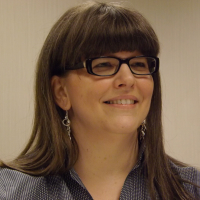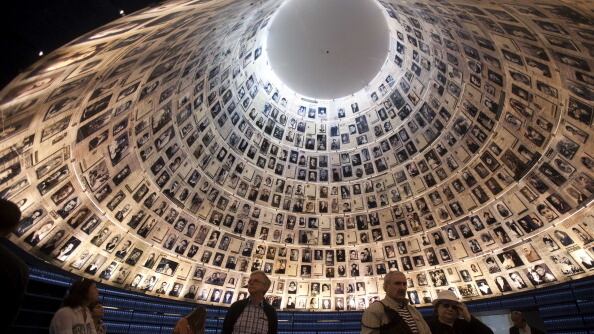The opportunity to report heartening news out of Israel/Palestine has all but disappeared as the decades have progressed. As walls both literal and metaphorical reach to the skies, the sides' ability to see each other's humanity has shrunk and shriveled, and one is occasionally left wondering why either side would even try anymore.
And yet many continue to do just that.

Haaretz reported yesterday on a Palestinian-Israeli group that recently visited Yad Vashem, the Holocaust Museum in Jerusalem, as part of an ongoing series of trips into each other's worlds—and perhaps the most striking element of the tour was that it was conducted in Arabic:
Familiar with this horrendous chapter in history, the Israelis followed the commentary and exhibits mostly in rapt silence. For the young Palestinians who were being exposed to the full extent of Nazi atrocities for the first time, their attempts to grasp the enormity led them to ply our guide with questions.
"If the Jews were so assimilated and successful, why did the Germans turn against them?"
"Was Einstein Jewish?"
"Why did the Jews believe the lies about the Nazi death camps?"
Israeli journalist Nir Boms, one of the group's founders, explains that "the idea behind the initiative is to expose each side to the other side's narrative, and to have a very deep conversation about it."
A similar view was voiced by [group member] Ibrahim Yassin, an activist and professional cook from East Jerusalem whose night job as a DJ is clear by his look.
"Personally, I think this trip is very interesting because it's breaking down the walls between us: Israelis and Palestinians," he says.
A similar motivation lies at the root of a story reported last week about Mejdi, a “dual narrative” tour company, in which tours are conducted jointly by Israeli and Palestinian tour guides in Jerusalem and beyond:
Aziz Abu Sarah, 32, grew up in East Jerusalem throwing rocks at Israeli soldiers, the only Jews he had ever met. Student Shira Nesher, 24, had toured East Jerusalem as a military tour guide during her national service, teaching soldiers about the Arab enemy.
On this summer afternoon in Jerusalem, they stood together in front of 28 tourists—Israelis, foreigners and two Palestinians—to describe what they had learned in the years since.
Abu Sarah motions toward Mount Scopus' western slope and the Jewish and Arab neighborhoods, explaining that Holy Land history told by Israeli guides usually starts with King David around 3,000 years ago and is silent on the Muslim periods. Palestinian guides, he said, might mention King David but generally focus on Muslim history beginning 1,400 years ago, while remaining silent on Jewish history.
Now, he quipped, "two tour guides are going to try to contradict each other."
Despite his rock-throwing past, Abu Sarah now has a long resume of working on co-existence efforts. In addition to being a co-founder (along with two American Jewish partners) of Mejdi, he is also co-executive director of the Center for World Religions, Diplomacy and Conflict Resolution at George Mason University (which is headed by one of his Mejdi partners, Rabbi Marc Gopin), and also frequently writes for Israeli web magazine +972.
"The Bible talks negatively about zeal without knowledge," says Abu Sarah. "If people learn both sides, outsider involvement in this conflict can be positive. This model is also influencing [local people] who, observing these tours, realize that there are different narratives."
As someone who has declared more than once that she is done hoping for anything good in Israel/Palestine, stories like these serve to remind me that the people on the ground, living with the violence and the fear, have not yet given up, and so I may not either. Dialogue is no panacea, and if political solutions are not found, will never prove to be enough.
But dialogue matters. Looking each other in the eyes matters. Our stories matter. All of them.






